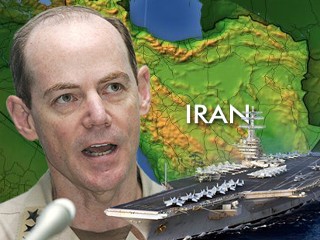U.S. Commander: Iran War Would Be ‘Disastrous’
U.S. Navy's Persian Gulf Commander Says War With Iran Would Cause 'Aftershocks' in the Region

By JONATHAN KARL and LUIS MARTINEZ
May 28, 2008
The top U.S. Navy official in the Persian Gulf warned in an interview with ABC News that war with Iran would be “pretty disastrous,” with “echoes and aftershocks” reverberating throughout the region.
“Nobody I’ve spoken to suggests that going to war with Iran is a good thing,” Vice Adm. Kevin Cosgriff told ABC News. “The preferred path by far is the diplomatic path, keep working with the international community to bring the right sort of pressure to bear on the Islamic Republic of Iran.”
For years, there has been a swirl of speculation about the prospects of war, as the United States has accused Iran of arming militias in Iraq, trying to develop nuclear weapons and supporting terrorism. President Bush and other top U.S. officials have repeatedly stressed diplomacy when it comes to Iran, but say “all options are on the table,” including the military option.
If it did come to waging war with Iran, Adm. Cosgriff’s forces would likely play a central role. As the head of the Fifth Fleet, he is the commander of U.S. naval forces in the Persian Gulf.
“As I look at the landscape, we should just sort of keep the pressure on, the big pressure, diplomatic, economic,” he said.
“Part of that [pressure] is for military forces, in this case the United States Fifth Fleet, to say we intend to be able to conduct operations in that part of the world in support of our friends and U.S. interests without being harassed or threatened by you, because we are not threatening you,” Cosgriff said. “We have been there for decades; we are going to be there for decades.”
Cosgriff believes “we have years” to deal with Iran’s nuclear program because “It’s going to take them a while to do all it will take to finish all the work that needs to go into developing a weapon,” but he fears that a miscalculation or misunderstanding could lead to military conflict with the United States.
One worrying development being carefully watched by the Navy, he said, is that the Iranian Revolutionary Guard says it is training a cadre of suicide bombers capable of attacking U.S. ships.
In January, a group of small Iranian speedboats aggressively approached U.S. war ships in the Persian Gulf. After repeated warnings, the boats eventually backed off, but at least one of them, operated by four members of the Iranian Revolutionary Guard, came close to being fired on by the Navy ships.
“The four Iranian Revolutionary Guard people came within 10 seconds of being dead,” Cosgriff said.
Such an incident could spiral into a larger conflict, which is why Cosgriff says the overarching direction he gives his sailors is “disciplined restraint: Don’t allow yourself to be provoked by some local yokel. ln the same breath, I say don’t allow yourself to be successfully attacked.”

